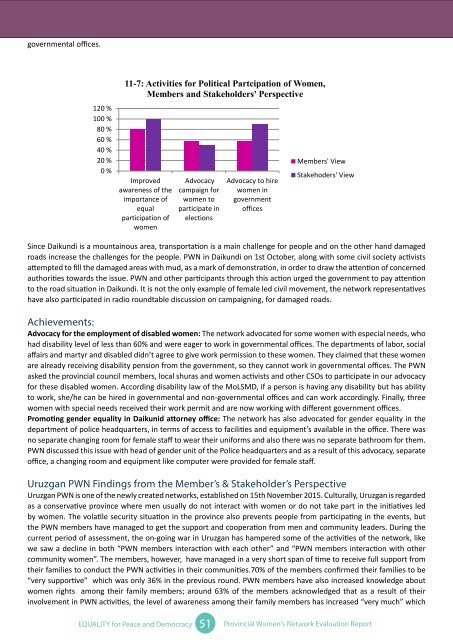Evaluation Report
4HMKrjjbt
4HMKrjjbt
You also want an ePaper? Increase the reach of your titles
YUMPU automatically turns print PDFs into web optimized ePapers that Google loves.
governmental offices.<br />
120 %<br />
100 %<br />
80 %<br />
60 %<br />
40 %<br />
20 %<br />
0 %<br />
11-7: Activities for Political Partcipation of Women,<br />
Members and Stakeholders' Perspective<br />
Improved<br />
awareness of the<br />
importance of<br />
equal<br />
participation of<br />
women<br />
Advocacy<br />
campaign for<br />
women to<br />
participate in<br />
elections<br />
Advocacy to hire<br />
women in<br />
government<br />
offices<br />
Members' View<br />
Stakehoders' View<br />
Since Daikundi is a mountainous area, transportation is a main challenge for people and on the other hand damaged<br />
roads increase the challenges for the people. PWN in Daikundi on 1st October, along with some civil society activists<br />
attempted to fill the damaged areas with mud, as a mark of demonstration, in order to draw the attention of concerned<br />
authorities towards the issue. PWN and other participants through this action urged the government to pay attention<br />
to the road situation in Daikundi. It is not the only example of female led civil movement, the network representatives<br />
have also participated in radio roundtable discussion on campaigning, for damaged roads.<br />
Achievements:<br />
Advocacy for the employment of disabled women: The network advocated for some women with especial needs, who<br />
had disability level of less than 60% and were eager to work in governmental offices. The departments of labor, social<br />
affairs and martyr and disabled didn’t agree to give work permission to these women. They claimed that these women<br />
are already receiving disability pension from the government, so they cannot work in governmental offices. The PWN<br />
asked the provincial council members, local shuras and women activists and other CSOs to participate in our advocacy<br />
for these disabled women. According disability law of the MoLSMD, if a person is having any disability but has ability<br />
to work, she/he can be hired in governmental and non-governmental offices and can work accordingly. Finally, three<br />
women with special needs received their work permit and are now working with different government offices.<br />
Promoting gender equality in Daikunid attorney office: The network has also advocated for gender equality in the<br />
department of police headquarters, in terms of access to facilities and equipment’s available in the office. There was<br />
no separate changing room for female staff to wear their uniforms and also there was no separate bathroom for them.<br />
PWN discussed this issue with head of gender unit of the Police headquarters and as a result of this advocacy, separate<br />
office, a changing room and equipment like computer were provided for female staff.<br />
Uruzgan PWN Findings from the Member’s & Stakeholder’s Perspective<br />
Uruzgan PWN is one of the newly created networks, established on 15th November 2015. Culturally, Uruzgan is regarded<br />
as a conservative province where men usually do not interact with women or do not take part in the initiatives led<br />
by women. The volatile security situation in the province also prevents people from participating in the events, but<br />
the PWN members have managed to get the support and cooperation from men and community leaders. During the<br />
current period of assessment, the on-going war in Uruzgan has hampered some of the activities of the network, like<br />
we saw a decline in both “PWN members interaction with each other” and “PWN members interaction with other<br />
community women”. The members, however, have managed in a very short span of time to receive full support from<br />
their families to conduct the PWN activities in their communities.70% of the members confirmed their families to be<br />
“very supportive” which was only 36% in the previous round. PWN members have also increased knowledge about<br />
women rights among their family members; around 63% of the members acknowledged that as a result of their<br />
involvement in PWN activities, the level of awareness among their family members has increased “very much” which<br />
EQUALITY for Peace and Democracy<br />
51<br />
Provincial Women's Network <strong>Evaluation</strong> <strong>Report</strong>


